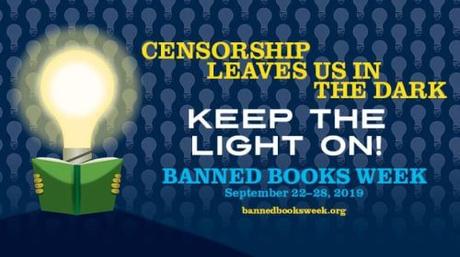Though lily-livered fools have been demanding they be “protected” from ideas they don’t like for several years now, it’s terrifying how quickly this terrible idea has moved from the lunatic fringe to the mainstream. – “Suppression”
 For one educated in the Seventies and Eighties, and trained as a librarian in the early Nineties, the landscape of intellectual freedom has become almost unrecognizeable. For the majority of my life, and the majority of time for which “Banned Books Week” has existed, top-down censorship attempts in the Western world were rare; attempts to ban books, censor websites and suppress speech generally came from non-government authoritarian groups and the majority of educated people could be counted on to oppose and ridicule them. But in this century, the sick need to control others’ thoughts grew as the internet made it easier for those thoughts to be shared, and early last year top-down government censorship returned with a vengeance thanks to the Great Unwashed eagerly swallowing racist claims about “human trafficking” and magically baneful effects of anything to do with sex. The US enacted FOSTA, leading to a wave of internet censorship; the UK is trying to build a massive firewall comparable to China’s; the EU has enacted law after law allowing greedy corporations and finger-pointing Prunellas alike power over others’ web-browsing; and every two-bit dictatorship has recognized that all it needs to do to justify thought control is parrot Western “hate speech” idiocy. Free speech (derided by “progressive”-flavored authoritarians as “freeze peach”) has noticeably declined all over the world:
For one educated in the Seventies and Eighties, and trained as a librarian in the early Nineties, the landscape of intellectual freedom has become almost unrecognizeable. For the majority of my life, and the majority of time for which “Banned Books Week” has existed, top-down censorship attempts in the Western world were rare; attempts to ban books, censor websites and suppress speech generally came from non-government authoritarian groups and the majority of educated people could be counted on to oppose and ridicule them. But in this century, the sick need to control others’ thoughts grew as the internet made it easier for those thoughts to be shared, and early last year top-down government censorship returned with a vengeance thanks to the Great Unwashed eagerly swallowing racist claims about “human trafficking” and magically baneful effects of anything to do with sex. The US enacted FOSTA, leading to a wave of internet censorship; the UK is trying to build a massive firewall comparable to China’s; the EU has enacted law after law allowing greedy corporations and finger-pointing Prunellas alike power over others’ web-browsing; and every two-bit dictatorship has recognized that all it needs to do to justify thought control is parrot Western “hate speech” idiocy. Free speech (derided by “progressive”-flavored authoritarians as “freeze peach”) has noticeably declined all over the world:
…First, ruling parties in many countries have found new tools for suppressing awkward facts and ideas. Second, they feel emboldened to use such tools, partly because global support for free speech has faltered. Neither of the world’s superpowers is likely to stand up for it. China ruthlessly censors dissent at home and exports the technology to censor it abroad. The United States, once a champion of free expression, is now led by a man who says things like…“free speech is not when you see something good and then you purposely write bad”…Censorious authoritarians elsewhere often cite Mr Trump’s catchphrases, calling critical reporting “fake news” and critical journalists “enemies of the people”. The notion that certain views should be silenced is popular on the left, too. In Britain and America students shout down speakers they [disagree with]…and Twitter mobs demand the sacking of anyone who violates an expanding list of taboos. Many western radicals contend that if they think something is offensive, no one should be allowed to say it. Authoritarians elsewhere agree. What counts as offensive is subjective, so “hate speech” laws can be elastic tools for criminalising dissent…
That article has a lot of good examples of the rise of (often violent) censorship, but beware; even the authors of this ostensibly pro-free-thought piece have been infected by the need to choose a “side” and skew information accordingly. As I wrote four years ago, Ray Bradbury’s view of future censorship practices was prescient; where else but in “a culture which values feelings above thought” could a video display service ban an historically-important anti-Nazi diocumentary from 1938 for violating its policy against “hate speech”? Or perhaps Google is just feeling a bit self-conscious, given that it’s currently in a fascist collaboration to develop a censorship-enabled search engine for China. Meanwhile, the US is trying to silence Edward Snowden by seizing the profits from his new book; I suggest you buy a paper copy to preclude Amazon’s stealing electronic copies from your Kindle at the behest of its pals in Washington. The censor-morons are loose, and they’re attacking the small targets so their totalitarian masters can expend their energy on big ones like the internet, the publishing industry and what little is left of the independent press.
